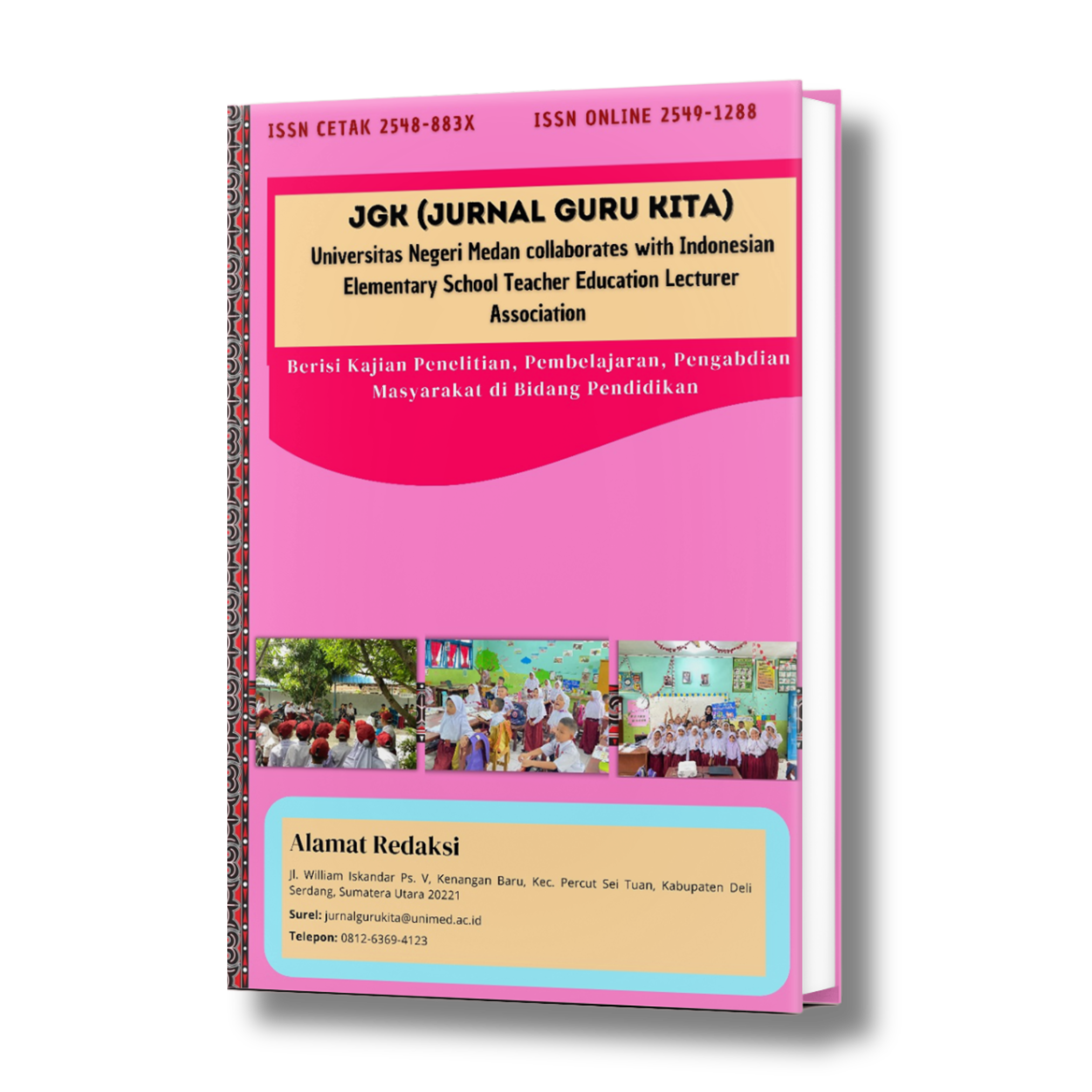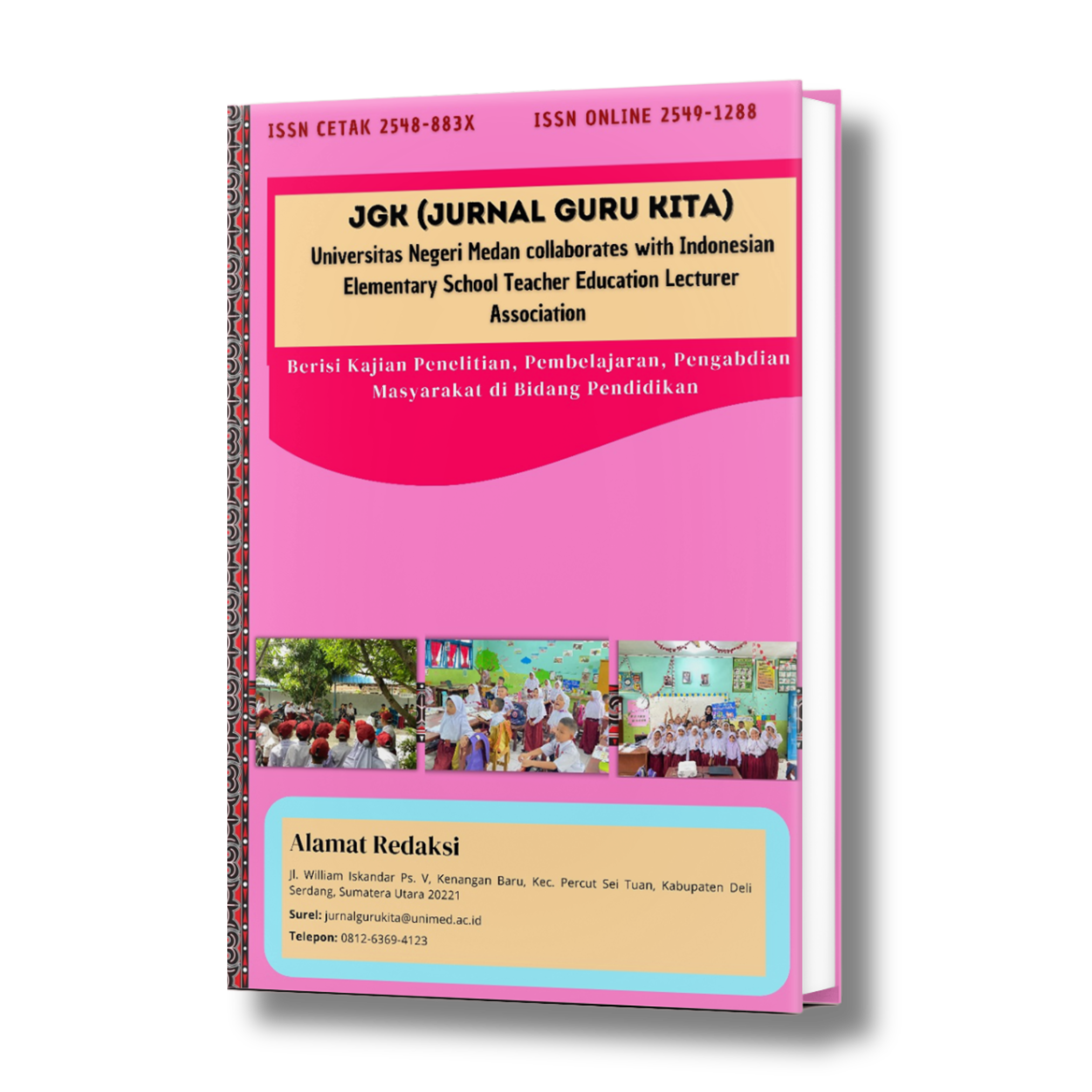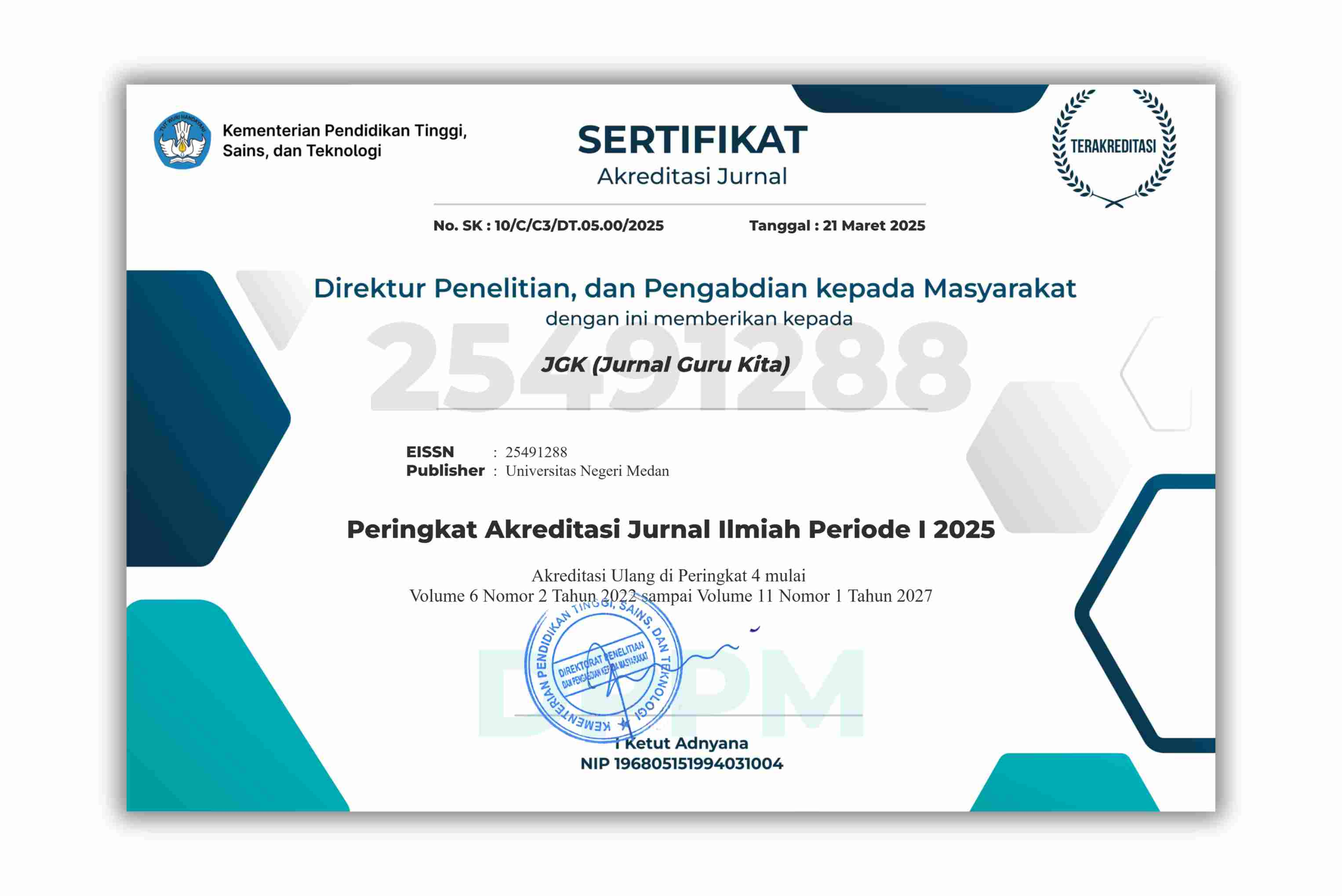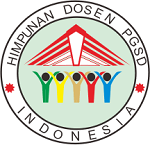Peran Guru dalam Mengembangkan Kreativitas Peserta Didik Kelas 4 Mata Pelajaran IPA melalui Pembelajaran Berbasis Proyek di SD Negeri 1 Tanjung Sari Tirtomoyo
DOI:
https://doi.org/10.24114/jgk.v9i4.69454Keywords:
Kreativitas, IPA, Pembelajaran Berbasis ProyekAbstract
Tujuan Penelitian ini adalah untuk mendeskripsikan peran guru dalam mengembangkan kreativitas peserta didik kelas 4 pada mata pelajaran ipa melalui pembelajaran berbasis proyek di SD Negeri 1 Tanjung Sari Tirtomoyo. Teknik analisis data yang digunakan adalah interaktif dengan pendekatan kualitatif yang melalui proses pengumpulan data (wawancara, observasi, dan dokumentasi), reduksi data, penyajian data dan penarikan kesimpulan. Hasil penelitian ini menunjukkan bahwa peran guru dalam mengembangkan kreativitas peserta didik kelas 4 pada mata pelajaran ipa melalui pembelajaran berbasis proyek yakni sebagai fasilitator yang membimbing peserta didik untuk mengeksplorasi ide dan melakukan eksperimen sederhana. Selain itu, guru juga memberikan motivasi, dukungan, serta menciptakan suasana belajar yang menyenangkan dan terbuka, sehingga peserta didik merasa bebas untuk berinovasi dan mengembangkan potensinya secara maksimal. Penelitian ini merekomendasikan peningkatan kapasitas guru dan pengembangan kreativitas peserta didik kelas 4 pada mata pelajaran ipa melalui pembelajaran berbasis proyek.References
Anderson, R. C., Katz-Buonincontro, J., Bousselot, T., Mattson, D., Beard, N., Land, J., & Livie, M. (2022). How am I a creative teacher? Beliefs, values, and affect for integrating creativity in the classroom. Teaching and Teacher Education, 110, 103583. https://doi.org/10.1016/j.tate.2021.103583
Avcı, Ü., & Yildiz Durak, H. (2023). Innovative thinking skills and creative thinking dispositions in learning environments: Antecedents and consequences. Thinking Skills and Creativity, 47, 101225. https://doi.org/10.1016/j.tsc.2022.101225
Badshah, A., Ghani, A., Daud, A., Jalal, A., Bilal, M., & Crowcroft, J. (2024). Towards Smart Education through Internet of Things: A Survey. ACM Computing Surveys, 56(2), 1–33. https://doi.org/10.1145/3610401
Blaskó, Z., Costa, P. da, & Schnepf, S. V. (2022). Learning losses and educational inequalities in Europe: Mapping the potential consequences of the COVID-19 crisis. Journal of European Social Policy, 32(4), 361–375. https://doi.org/10.1177/09589287221091687
Chen, Y., & Zhai, J. (2025). Plant awareness in science education: an examination of image representation and labelling in primary school textbooks. Journal of Biological Education, 1–18. https://doi.org/10.1080/00219266.2025.2502376
Cho, Y., & Park, K. S. (2023). Designing Immersive Virtual Reality Simulation for Environmental Science Education. Electronics, 12(2), 315. https://doi.org/10.3390/electronics12020315
Çilingir Altiner, E. (2025). Unraveling the creative mathematical thinking of primary school children: A qualitative exploration. The Journal of Educational Research, 1–18. https://doi.org/10.1080/00220671.2025.2525247
Dare, E. A., Keratithamkul, K., Hiwatig, B. M., & Li, F. (2021). Beyond Content: The Role of STEM Disciplines, Real-World Problems, 21st Century Skills, and STEM Careers within Science Teachers’ Conceptions of Integrated STEM Education. Education Sciences, 11(11), 737. https://doi.org/10.3390/educsci11110737
Dawson, C., Julku, H., Pihlajamäki, M., Kaakinen, J. K., Schooler, J. W., & Simola, J. (2024). Evidence-based scientific thinking and decision-making in everyday life. Cognitive Research: Principles and Implications, 9(1), 50. https://doi.org/10.1186/s41235-024-00578-2
Donelan, H., & Kear, K. (2024). Online group projects in higher education: persistent challenges and implications for practice. Journal of Computing in Higher Education, 36(2), 435–468. https://doi.org/10.1007/s12528-023-09360-7
Dong, C. (2024). Educational Concepts and Methodologies in the AI Era: Challenges and Responses. Frontiers of Digital Education, 1(1), 69–77. https://doi.org/10.1007/s44366-024-0022-y
Duong, C. D., Vu, T. N., & Ngo, T. V. N. (2023). Applying a modified technology acceptance model to explain higher education students’ usage of ChatGPT: A serial multiple mediation model with knowledge sharing as a moderator. The International Journal of Management Education, 21(3), 100883. https://doi.org/10.1016/j.ijme.2023.100883
González-Pérez, L. I., & Ramírez-Montoya, M. S. (2022). Components of Education 4.0 in 21st Century Skills Frameworks: Systematic Review. Sustainability, 14(3), 1493. https://doi.org/10.3390/su14031493
Hackworth, J. T. (2024). Using Humor in the Health/Physical Education Classroom to Create an Enjoyable Learning Environment. Journal of Physical Education, Recreation & Dance, 95(2), 41–48. https://doi.org/10.1080/07303084.2023.2291643
Hajek, K. M., Paul, H., & ten Hagen, S. (2024). Objectivity, honesty, and integrity: How American scientists talked about their virtues, 1945–2000. History of Science, 62(3), 442–469. https://doi.org/10.1177/00732753231206773
Haritas, I., & Harini, K. N. (2025). ‘Solving’ as a key course learning outcome (CLO) in postgraduate (PG) management education. The International Journal of Management Education, 23(3), 101225. https://doi.org/10.1016/j.ijme.2025.101225
Hsia, L., Lin, Y., & Hwang, G. (2021). A creative problem solving‐based flipped learning strategy for promoting students’ performing creativity, skills and tendencies of creative thinking and collaboration. British Journal of Educational Technology, 52(4), 1771–1787. https://doi.org/10.1111/bjet.13073
Hussein, B. (2021). Addressing Collaboration Challenges in Project-Based Learning: The Student’s Perspective. Education Sciences, 11(8), 434. https://doi.org/10.3390/educsci11080434
Hwang, G., Chang, C., & Chien, S. (2022). A motivational model‐based virtual reality approach to prompting learners’ sense of presence, learning achievements, and higher‐order thinking in professional safety training. British Journal of Educational Technology, 53(5), 1343–1360. https://doi.org/10.1111/bjet.13196
Idris, M., Bin Tahir, S. Z., Wilya, E., Yusriadi, Y., & Sarabani, L. (2022). Availability and Accessibility of Islamic Religious Education Elementary School Students in Non-Muslim Base Areas, North Minahasa, Indonesia. Education Research International, 2022, 1–11. https://doi.org/10.1155/2022/6014952
Jääskä, E., & Aaltonen, K. (2022). Teachers’ experiences of using game-based learning methods in project management higher education. Project Leadership and Society, 3, 100041. https://doi.org/10.1016/j.plas.2022.100041
Jamali, S. M., Ale Ebrahim, N., & Jamali, F. (2023). The role of STEM Education in improving the quality of education: a bibliometric study. International Journal of Technology and Design Education, 33(3), 819–840. https://doi.org/10.1007/s10798-022-09762-1
Karwasz, G. P., & Wyborska, K. (2023). How Constructivist Environment Changes Perception of Learning: Physics Is Fun. Education Sciences, 13(2), 195. https://doi.org/10.3390/educsci13020195
Kaufmann, L., & Reimann, F. (2025). From teaching with cases to teaching through case development: Making purchasing managers and students the designers of learning journeys. Journal of Purchasing and Supply Management, 31(2), 100970. https://doi.org/10.1016/j.pursup.2024.100970
Khodadad, D. (2023). Creating a Supportive and Effective Learning Environment for Engineering Students. International Journal of Engineering Pedagogy (IJEP), 13(8), 33–50. https://doi.org/10.3991/ijep.v13i8.41755
Kumar, P., Sahani, J., Rawat, N., Debele, S., Tiwari, A., Mendes Emygdio, A. P., Abhijith, K. V., Kukadia, V., Holmes, K., & Pfautsch, S. (2023). Using empirical science education in schools to improve climate change literacy. Renewable and Sustainable Energy Reviews, 178, 113232. https://doi.org/10.1016/j.rser.2023.113232
Lakkala, S., Galkienė, A., Navaitienė, J., Cierpiałowska, T., Tomecek, S., & Uusiautti, S. (2021). Teachers Supporting Students in Collaborative Ways—An Analysis of Collaborative Work Creating Supportive Learning Environments for Every Student in a School: Cases from Austria, Finland, Lithuania, and Poland. Sustainability, 13(5), 2804. https://doi.org/10.3390/su13052804
Lange, F. (2022). Behavioral paradigms for studying pro-environmental behavior: A systematic review. Behavior Research Methods, 55(2), 600–622. https://doi.org/10.3758/s13428-022-01825-4
Lee, H.-Y., Cheng, Y.-P., Wang, W.-S., Lin, C.-J., & Huang, Y.-M. (2023). Exploring the Learning Process and Effectiveness of STEM Education via Learning Behavior Analysis and the Interactive-Constructive- Active-Passive Framework. Journal of Educational Computing Research, 61(5), 951–976. https://doi.org/10.1177/07356331221136888
Lin, C.-C., Han, C.-Y., Huang, Y.-L., & Chen, L.-C. (2025). Constructing learning confidence through jigsaw, concept maps and group cooperative learning: A qualitative study. Nurse Education in Practice, 82, 104239. https://doi.org/10.1016/j.nepr.2024.104239
Matovu, H., Ungu, D. A. K., Won, M., Tsai, C.-C., Treagust, D. F., Mocerino, M., & Tasker, R. (2023). Immersive virtual reality for science learning: Design, implementation, and evaluation. Studies in Science Education, 59(2), 205–244. https://doi.org/10.1080/03057267.2022.2082680
Miller, E. C., Severance, S., & Krajcik, J. (2021). Motivating Teaching, Sustaining Change in Practice: Design Principles for Teacher Learning in Project-Based Learning Contexts. Journal of Science Teacher Education, 32(7), 757–779. https://doi.org/10.1080/1046560X.2020.1864099
Mohamad Hsbollah, H., & Hassan, H. (2022). CREATING MEANINGFUL LEARNING EXPERIENCES WITH ACTIVE, FUN, AND TECHNOLOGY ELEMENTS IN THE PROBLEM-BASED LEARNING APPROACH AND ITS IMPLICATIONS. Malaysian Journal of Learning and Instruction, 19. https://doi.org/10.32890/mjli2022.19.1.6
Nguyen, L. T., Kanjug, I., Lowatcharin, G., Manakul, T., Poonpon, K., Sarakorn, W., Somabut, A., Srisawasdi, N., Traiyarach, S., & Tuamsuk, K. (2022). How teachers manage their classroom in the digital learning environment – experiences from the University Smart Learning Project. Heliyon, 8(10), e10817. https://doi.org/10.1016/j.heliyon.2022.e10817
Oliveira, H., & Bonito, J. (2023). Practical work in science education: a systematic literature review. Frontiers in Education, 8. https://doi.org/10.3389/feduc.2023.1151641
Pandey, A., Mittal, M., Ahmad, K., & Sharma, V. (2023). New Age Teaching Pedagogy. In Redefining Virtual Teaching Learning Pedagogy (pp. 59–73). Wiley. https://doi.org/10.1002/9781119867647.ch4
Paramitha, I. D. A. A., & Margunayasa, I. G. (2016). PENGARUH MODEL INKUIRI TERBIMBING, GAYA KOGNITIF, DAN MOTIVASI BERPRESTASI TERHADAP PEMAHAMAN KONSEP IPA SISWA KELAS V SD. Jurnal Pendidikan Dan Pengajaran, 49(2), 80. https://doi.org/10.23887/jppundiksha.v49i2.9012
Peters, S. J. (2022). The Challenges of Achieving Equity Within Public School Gifted and Talented Programs. Gifted Child Quarterly, 66(2), 82–94. https://doi.org/10.1177/00169862211002535
Rahmawati, Y., Taylor, E., Taylor, P. C., Ridwan, A., & Mardiah, A. (2022). Students’ Engagement in Education as Sustainability: Implementing an Ethical Dilemma-STEAM Teaching Model in Chemistry Learning. Sustainability, 14(6), 3554. https://doi.org/10.3390/su14063554
Ramírez-Montoya, M. S., Castillo-Martínez, I. M., Sanabria-Z, J., & Miranda, J. (2022). Complex Thinking in the Framework of Education 4.0 and Open Innovation—A Systematic Literature Review. Journal of Open Innovation: Technology, Market, and Complexity, 8(1), 4. https://doi.org/10.3390/joitmc8010004
Rehman, N., Zhang, W., Mahmood, A., Fareed, M. Z., & Batool, S. (2023). Fostering twenty-first century skills among primary school students through math project-based learning. Humanities and Social Sciences Communications, 10(1), 424. https://doi.org/10.1057/s41599-023-01914-5
Retno, R. S., Purnomo, P., Hidayat, A., & Mashfufah, A. (2025). Conceptual framework design for STEM-integrated project-based learning (PjBL-STEM) for elementary schools. Asian Education and Development Studies, 14(3), 579–604. https://doi.org/10.1108/AEDS-08-2024-0188
Şahin, A. (2021). Humor Use in School Settings: The Perceptions of Teachers. Sage Open, 11(2). https://doi.org/10.1177/21582440211022691
Sasson Lazovsky, G., Raz, T., & Kenett, Y. N. (2025). The Art of Creative Inquiry—From Question Asking to Prompt Engineering. The Journal of Creative Behavior, 59(1). https://doi.org/10.1002/jocb.671
Shutaleva, A. (2023). Ecological Culture and Critical Thinking: Building of a Sustainable Future. Sustainability, 15(18), 13492. https://doi.org/10.3390/su151813492
Sivakumar, A., Jayasingh, S., & Shaik, S. (2023). Social Media Influence on Students’ Knowledge Sharing and Learning: An Empirical Study. Education Sciences, 13(7), 745. https://doi.org/10.3390/educsci13070745
Soto-Sanfiel, M. T., Chong, C.-W., & Latorre, J. I. (2025). Hype in science communication: exploring scientists’ attitudes and practices in quantum physics. Humanities and Social Sciences Communications, 12(1), 845. https://doi.org/10.1057/s41599-025-05200-4
Sugiyono, S. (2019). Metode Penelitian Pendidikan (Kuantitatif, Kualitatif, Kombinasi, R&D dan Penelitian Pendidikan). CV. Alfabeta.
Sugiyono, S. (2022). Metode Penelitian Kuantitatif, Kualitatif Dan R&D. Alfabeta.
Tejedor, S., Cervi, L., Pérez-Escoda, A., Tusa, F., & Parola, A. (2021). Higher Education Response in the Time of Coronavirus: Perceptions of Teachers and Students, and Open Innovation. Journal of Open Innovation: Technology, Market, and Complexity, 7(1), 43. https://doi.org/10.3390/joitmc7010043
Velander, J., Taiye, M. A., Otero, N., & Milrad, M. (2024). Artificial Intelligence in K-12 Education: eliciting and reflecting on Swedish teachers’ understanding of AI and its implications for teaching & learning. Education and Information Technologies, 29(4), 4085–4105. https://doi.org/10.1007/s10639-023-11990-4
Wen, C.-T., Liu, C.-C., Chang, H.-Y., Chang, C.-J., Chang, M.-H., Fan Chiang, S.-H., Yang, C.-W., & Hwang, F.-K. (2020). Students’ guided inquiry with simulation and its relation to school science achievement and scientific literacy. Computers & Education, 149, 103830. https://doi.org/10.1016/j.compedu.2020.103830
Wijnia, L., Noordzij, G., Arends, L. R., Rikers, R. M. J. P., & Loyens, S. M. M. (2024). The Effects of Problem-Based, Project-Based, and Case-Based Learning on Students’ Motivation: a Meta-Analysis. Educational Psychology Review, 36(1), 29. https://doi.org/10.1007/s10648-024-09864-3
Windyariani, S., & Sutisnawati, A. (2016). Pengembangan bahan ajar berbasis konteks dan kreativitas untuk melatihkan literasi sains siswa sekolah dasar. Jurnal Bioedukatika, 4(2), 19–25.
Wu, X.-Y. (2024). Unveiling the dynamics of self-regulated learning in project-based learning environments. Heliyon, 10(5), e27335. https://doi.org/10.1016/j.heliyon.2024.e27335
Yang, X. (2023). A Historical Review of Collaborative Learning and Cooperative Learning. TechTrends, 67(4), 718–728. https://doi.org/10.1007/s11528-022-00823-9
Zhang, L., & Ma, Y. (2023). A study of the impact of project-based learning on student learning effects: a meta-analysis study. Frontiers in Psychology, 14. https://doi.org/10.3389/fpsyg.2023.1202728
Downloads
Published
How to Cite
Issue
Section
License
Copyright (c) 2025 Oney Putri Fedika Sari, Meidawati Suswandari

This work is licensed under a Creative Commons Attribution-ShareAlike 4.0 International License.
Authors published with the JGK (Jurnal Guru Kita) agree to the following terms:
- Authors retain copyright and grant the journal the right of first publication with the work simultaneously licensed under a Creative Commons Attribution License (CC BY-SA 4.0) that allows others to share the work with an acknowledgment of the work's authorship and initial publication in this journal.
- Authors are able to enter into separate, additional contractual arrangements for the non-exclusive distribution of the journal's published version of the work (e.g., post it to an institutional repository or publish it in a book), with an acknowledgment of its initial publication in this journal.
- Authors are permitted and encouraged to post their work online (e.g., in institutional repositories or on their website) prior to and during the submission process, as it can lead to productive exchanges, as well as earlier and greater citation of published work. (See The Effect of Open Access)

























